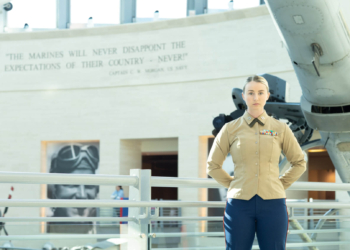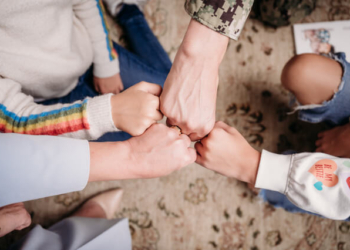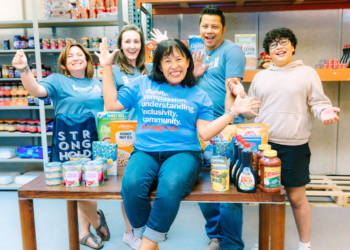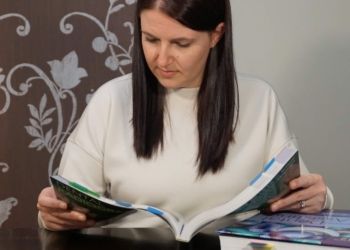Over 19 months, this Coast Guard family paid off $60,000 in debt. They didn’t inherit anything or win the lottery — they lived off of one enlisted service member’s salary, and worked a lot of side hustles to do it. And now they share their story, to show others that it isn’t about luck, it’s about hard work.
Just like everyone else
As high school sweethearts, Dan and Carissa spent like everyone else.
“Dan worked full time, I went to college, and I thought I had so much money,” Carissa said.
The couple lived like those around them, they bought a car, went out to dinner frequently, paid the bar tab for friends, and enjoyed giving lavish and expensive gifts.
“It never occurred to us that not having debt was how you should live,” she said. “It seemed normal that people had debt. Like this is how you were supposed to live.”
Then, for the first eight years of their marriage, they clung to the “keeping up with the Joneses” mentality.
“I had an affection for luxury vehicles,” Carissa admits. “It seemed like the more money we had, the more expensive things we wanted. Each anniversary was a vacation we thought we could afford, but Discover was paying for everything.”
With their first child on the way, the couple thought they were coming to their senses regarding debt and their financial future. But in reality, they didn’t even know how much they owed. They never had a plan; they didn’t talk about the numbers. And they didn’t make any progress.
Flipping the switch
Baby number two opened their eyes.
“We realized we were going to have to feed them, they were going to want things, they were going to go to college and [would] want cars,” Carissa said.
The amount they owed was growing, and a PCS was looming. Luckily for the family’s finances, Carissa first heard about Dave Ramsey on base when they moved to Florida. And it lit a fire in her to do something about their massive debt.
The pressure was mounting, as their third child was on the way. So they buckled down. They added up all their debt – luxury car, credit cards, and student loans. It came to almost $60,000. In shock, and as a stay at home mom with no income, Carissa started researching as much as possible.
“We were so strict we didn’t even buy the book or do Financial Peace University,” she admits. “I used Pinterest, I listened to the podcasts, and we talked weekly about our progress.”
Making a plan
It was more than just paying off debt; it was looking at their spending.
“I spent money because I had the time. I’d meet friends for coffee or go out to lunch,” she admits. But that had to stop.
The couple sat down and talked about what they wanted their life to look like in 10 years. They asked each other what they wanted retirement to look like, they wrote down their dreams, and what those dreams would cost.
“Our mentality completely shifted,” Carissa said. “We went from feeling like we should be able to do all of these things because everyone else did, to thinking about our future. I don’t care what they are doing; I care about the foundations we are laying for our future.”
So, how did they do it?
The Flanigans worked hard. Really hard. Dan drives for Uber, cuts grass, donates plasma, and does any other odd job he can find and do. Carissa babysits, cleans houses, walks and boards dogs, and now has a full-time nannying position. Staying home with her kids is important to her, but she knew she still had to contribute to their progress.
“Our progress really didn’t have that much to do with income,” she explained. “It’s really about how much I can save — not how much we can make.”
Losing more debt
And after 19 months of hard work, the Flanigans were debt free. It’s not quite that simple of a story though. Carissa shares that people thought they were weird working so much, almost like it was abnormal to work hard. When they hear about us being debt free, they talk about luck.
“That offends me. Luck has nothing do with how we ended up here. Sacrifice had everything to do with how we ended up debt free,” Carissa said.
It was a mindset shift more than anything else, and it was hard.
“We lived in Florida for three years, and we never went to Disney. We didn’t take any trips,” she said.
Carissa likes to dress the kids in matching outfits for photos and holidays, but she gave that up. “I constantly sold things instead of donating them. I shopped consignment. We never bought coffee out.”
These are all things that most people don’t think about, but they thought about them every day.
“We lived strictly on the cash in the envelope. I made it into a game to see how much was left at the end of the month,” she said. Carissa also gave up her luxury car. The Flanigans paid to get out of their lease early and then paid cash for a minivan with over 100,000 miles on it. $23,000 of their $60,000 debt was the car she wanted to keep but realized she couldn’t afford.
Giving up the car was hard, but what hurt the most was losing friends.
“People just thought we were crazy. They thought we were weird for doing this,” Carissa said. “I chose not to go out to lunch weekly, or meet at Target and spend money, and I lost friends along the way.”
Setting the standard for their kids
A lot of marriages falter over finances, and this was one area where the Flanigans joined together.
“Having kids put us on the same page,” Carissa said. “We were going to have a third child, and we didn’t have more than $1,000 in our bank account. We were 32 years old and when we had an emergency, we had to call a parent for help. It was a rude awakening.”
They were on the same page overall, but throughout the 19 months of hard work, there were times where one of them would waiver. They had to reel each other in, support each other, and keep their eyes on the goal. Their kids helped with that.
Their two oldest children, know Dave Ramsey. They know his voice, they know the intro music to the podcast. When their oldest, who is 5, earns money for a job she does, she saves some and she spends some, without complaint.
“Our kids don’t ask for things at the store – they know the answer will be no,” Carissa said. “But it makes it more fun when I do treat them.”
Maintaining their debt-free lifestyle
With so much focus on being debt free, the Flanigans weren’t sure what to do after that. They knew they didn’t want to borrow money again, but they weren’t quite sure how to make that happen.
“It took us a few months to get back on track with saving,” Carissa said.
It took them a few months to put $10,000 in the bank for a rainy day, and now they are looking at investing.
“Investing is a bit intimidating because we don’t know much about it,” she admitted.
But the couple is still making some big plans. Among those are paying cash for a home, building a nest egg for retirement, and making good choices. As they near another PCS, they have taken a new path – planning for it.
“We have a different way of approaching things,” Carissa said.
Read comments






























